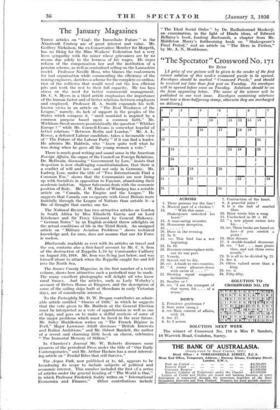The January Magazines
THREE articles on " Coal : the Immediate Future" in the Nineteenth Century are of great interest and value. Mr. Godfrey Nicholson, the ex-Conservative Member for Morpeth, has no liking for the Mine Workers' Federation but a very keen sympathy with the miner whose grievanees are by no means due solely to the lowness of his wages. He urges reform of the compensation law and the institution of a pension scheme, as well as centralised selling on the Lancashire model. Professor Neville Moss, who blames the coal-owners for bad organisation while conunending the efficiency of the mining engineers, sketches a scheme for the complete co-ordina- tion of the collieries that would weed out the less efficient pits and work the rest to their full capacity. He too lays stress on the need for better commercial management. Dr. C. S. Myers in a third article emphasises the importance of the human factor and of better relations between employers and employed. Professor H. A. Smith expounds his well- known views in an article on "The Real Weakness of the League," namely, its lack of support in the peoples of the States which compose it, "until mankind is inspired by a common purpose based upon a common faith." Mr. Wickham Steed answers pessimistically the question "Whither Europe ? " while Mr. Conwell-Evans is somewhat hopeful of better relations "Between Berlin and London." Mr. A. L. Rowse, a defeated Labour candidate, takes a favourable view of " The Future of the Labour Party" if it can find a leader. He admires Mr. Baldwin, who "knew quite well what he was doing when he gave all the young women a vote."
There is much good writing and sound sense in the American Foreign Affairs, the organ of the Council on Foreign Relations. Dr. MeIlwain, discussing "Government by Law," insists that despotism is now challenging constitutionalism, that there is a conflict of will and law-and not only in Germany. Mr. Ludwig Lore, under the title of "Two Internationals Find a Common Foe," shows that the Communists are now lining up with Socialists in opposition to Fascism, abandoning their academic isolation. Signor Salvemini deals with the economic position of Italy. Mr. J. W. Dafoe of Winnipeg has a notable article on "Canada, the Empire and the League." He suggests that Canada can co-operate with Great Britain more fruitfully through the League of Nations than outside it-a line of thought that carries one far.
The National Review has two attractive articles on Gordon in South Africa by Miss Elizabeth Garcia and on Lord Kitchener and Sir Percy Girouard by General Blakeney. "German Notes" by an English resident throw sidelights on the actual conditions of life in the Third Reich. An unsigned article on "Military Aviation Problems" shows technical knowledge and, for once, does not assume that our Air Force is useless.
Blackwoods, readable as ever with its articles on travel and the sea, contains also a first-hand account by Mr. C. S. Iron of the destruction of Zeppelin L.70 by Commander Cadbury on August 5th, 1918. Mr. Iron was flying just below, and was himself about to attack when the Zeppelin caught fire and fell into the North Sea.
The Sussex County Magazine, in the first number of a tenth volume, shows how attractive such a periodical may be made. The many excellent photographs will delight all who know rural Sussex. And the articles, such as Lady Wolseley's account of Delves House at Ringmer, and the description of some of the sailing ships built at Shoreham in early Victorian days, are of considerable interest.
To the Fortnightly Mr. D. W. Brogan contributes an admir- able article entitled "Omens of 1936," in which he suggests that the vote given to Mr. Baldwin at the General Election must be interpreted as a vote of apprehension as well as one of hope, and goes on to make a skilful analysis of some of the major problems which must be faced in the near future. Mr. Sisley Huddleston writes on "The • French Regime in Peril," Major Lawrence Athill discusses "British Interests and Italian Ambitions," and Mr. Osbert Burdett, the author of a recent _and charming little book on cheese, celebrates "The Immortal Memory of Stilton."
In Chambers's Journal Mr. W. Roberts discusses some pioneers of the periodical Press under the title of "Our Early Contemporaries," and Mr. Arthur Haslam has a most interest- ing article on " Feudal Rites that still Survive."
The Aryan Path, now published at Is. 6d., appears to be broadening its scope to include subjects of political and economic interest. This number included the first of a series of articles under the general heading of "The World is One," in which Professor Frederick Soddy writes on "International Economics and Finance" Other contributions include "The Ideal Social Order" by Dr. Radhakumud Mookerji, an examination, in the light of Hindu ideas, of Edward I3ellamy's book, Looking Backwards, a chapter from Mr. Middleton Murry's forthcoming book on "Shakespeare's Final Period," and an article on "The Hero in Fiction," by Mr. A. N. Monlchouse.










































 Previous page
Previous page